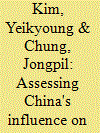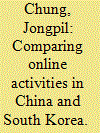| Srl | Item |
| 1 |
ID:
108532


|
|
|
|
|
| Publication |
2011.
|
| Summary/Abstract |
It is widely known that China's influence on Southeast Asia has been growing
rapidly since the Asian financial crisis of 1997. However, determining the true
dimensions of China's influence in this region is still controversial. It seems quite
conspicuous that the growing economic relations between China and the region
give China more bargaining power, due to the expanding role of the bilateral trade
and China's foreign aid in promoting the regional economic growth. However,
this does not give us a clear picture of how China has been able to exercise its
influence on the behavior of the states in the region for its own interests. Therefore,
this paper tries to assess China's influence on Southeast Asia by analyzing the
specific case of Taiwan. Recently, China's rising influence has significantly
affected Southeast Asia's relations with Taiwan. Southeast Asian states are paying
more attention to the cross-Strait relations when considering attempting to improve
relations with Taiwan. This research defines "influence" as the capability of state
A to affect the behavior of state B, either directly or indirectly, to comply with state
A's policy interests. If the diplomatic behavior of state B changes accordingly
due to the action, then it can be said that state A has illustrated its influence over
state B. By studying the Taiwan issue, this paper reveals that China has been
quite successful in exercising its influence on Southeast Asian states to comply
with China's policy toward Taiwan.
|
|
|
|
|
|
|
|
|
|
|
|
|
|
|
|
| 2 |
ID:
084159


|
|
|
| 3 |
ID:
121738


|
|
|
|
|
| Publication |
2013.
|
| Summary/Abstract |
We attribute the negative perceptions between South Korea and China to the absence of real argumentative interaction. Argumentative interaction is a social process that seeks mutual understanding through persuasive and noncoercive action. The argumentative process helps state actors to minimize their negative perceptions and to reach mutual understanding-an evolutionary process that leads to perceptional change. In the case of South Korea and China, two conditions are known to instigate arguing: uncertainty and conscious efforts by both actors. The governments and elites of both states should take significant roles in seeking policy alternatives and in building a healthy cyberspace.
|
|
|
|
|
|
|
|
|
|
|
|
|
|
|
|